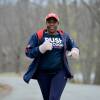From the beginning, men were the only long-distance racers. The first marathon was part of the first modern Olympic Games created by Pierre de Coubertin. But it was his friend, Michel Bréal, who is credited with proposing the run in 1896 based on the history of one specific Greek runner. He was Pheidippides, a soldier who ran nearly 25 miles from a battlefield near Marathon to Athens. It was 490 BC, and he ran to tell the Athenians that the Persians had been defeated. Perhaps marathon running would not have become an all-male sport if de Coubertin had also considered Greek mythology and the story of the fleetfooted Atalanta. She challenged would-be husbands to outrun her — knowing none of them could. Instead, modern marathons grew to be a global sport with exclusively male competitors.
That exclusion included the Boston Marathon until a few women forced an opening of the all-male ranks. Today’s 126th running of the Boston Marathon marks 50 years since women officially entered the race and recognizes the determined women who made it happen. First, starting in 1966 and for two years after, Bobbi Gibb ran and finished the race — the first year hiding in the bushes near the start of the race, and jumping in. She’d proved a woman could compete, but her run was still unauthorized. Katherine Switzer in 1967 was the first female Boston Marathoner to score an official bib — No. 261 — by registering using her initials K. V. Switzer was outed during the race, and in dramatic fashion, then-race manager Jock Semple tried to pull her off the route. Her boyfriend blocked the move and Switzer continued her run. But after that, the Amateur Athletic Union or AAU, banned women from competing in long-distance running until 1972 when the organization lifted the ban, allowing the Boston Marathon to establish the women’s division. Nina Kuscsik won, the first official champion. Seven other women also competed, including Val Rogosheske who recently told CBS News she originally planned on hiding in the bushes, saying, “If I’m totally honest, there was a little tiny part of me that was sort of disappointed to know that we were going to be welcome because my mindset was kind of focused on hiding,” In 1979 Marilyn Bevans broke another barrier when she finished second and became the first African-American woman to win a medal in Boston. Now in her 70s, Bevans told the website She Is Beautiful, “I wasn’t thinking about being the first Black woman. Honestly, I just wanted to be the best and compete.” An honorary team of eight women — including Val Rogosheske — today will honor the legacy of women in the Boston Marathon.
The women who fought to run long distance races also had to fight the early 20th-century stigma against women enjoying exercise and competition. In her book, “Let’s Get Physical,” author Danielle Friedman points to cultural obstacles, which decreed it was unladylike for women to run, and to absurd myths put forward as fact, that running would cause a woman’s uterus would fall out.
After her infamous run, Katherine Switzer became a TV commentator, broadcasting over 200 running events, including 36 consecutive years of the Boston Marathon. But she never stopped running and, this morning, she’ll once again be at the starting line in Hopkinton — joining the 30,000 runners from 122 countries and all 50 states, including more than 12,000 women.
By their very presence, all of the women running this year’s race are paying tribute to the pathbreakers like Switzer. Look for them as they crest Heartbreak Hill with the wind of history at their backs.








